How to Make a No Discard Sourdough Starter
The EASIEST way to make a sourdough starter recipe from scratch: no measurements, no discards, and no feedings. It’s perfect for beginners!
Have you been wondering how to make the best sourdough starter?
Maybe you have been too intimidated by how complicated it sounds. Or maybe you had some sourdough failures and haven’t tried again.
This is such an easy sourdough starter recipe – with no discards ever!
Of course, you can always buy a starter and follow the instructions (you can find some great ones here).
But wouldn’t it be so much more satisfying and cheaper to make your own? You don’t even need a kitchen scale!
This method is so simple that it’s the perfect sourdough for beginners!
Origins of my old-fashioned sourdough starter recipe
I grew up eating sourdough bread. When my mom married my dad he told her to go to her new mother-in-law to learn how to make her own sourdough starter and bake sourdough bread. She then learned this generations-old sourdough starter recipe that I am still using today! So you can see I have been around sourdough for a very long time.
Fun fact: up until about 5 years ago I didn’t know that almost nobody else uses our method.
Why bake with sourdough?
Did you know that the first sourdough bread dates back to ancient Egypt about 6000 years ago? People found out that if they left the dough out, the gases of the wild yeasts leaven the bread.
Now, we understand that sourdough also breaks down the inherent phytic acid in grains.
The bacteria and yeast in the sourdough help to predigest the starches in the grains, thus making them more easily digestible. Often, people with gluten sensitivity have no issues eating sourdough bread.
Furthermore, even though you are baking your sourdough bread at about 350˚F, the inside never reaches that temperature. That means that the probiotics are still alive in there.
In contrast to yeast bread, sourdough bread stays fresh longer and is not as susceptible to mold.
For all these reasons, sourdough bread is so much healthier than bread made with commercial yeast.
The ingredients
For this no discard sourdough starter recipe, you will need:
- Flour: While you can use regular, all-purpose white flour, I highly recommend you use both unbleached and organic flour! We are trying to capture the wild yeast. In the process of bleaching the flour, many of the wild yeasts may be killed. Similarly, using non-organic flour means that the grains will have been sprayed with pesticides that kill exactly what we are trying to cultivate. You can also use whole wheat flour or any other whole-grain flour such as spelt, einkorn, or rye flour. Rye is actually the best flour for making your very first sourdough starter!
- Buttermilk: This is the key ingredient for this radically different method. You see, we are essentially jumpstarting the whole process by using something that already has active live cultures in it.
- Water: I am listing this as an ingredient because it is important WHAT kind of water you are using. The best is filtered, distilled, or bottled water. If you’re using tap water, there is a good chance that it has chlorine in it. This will inhibit the growth of the good bacteria we are trying to cultivate.
- Caraway seeds: I know, I know, they are a very unconventional ingredient in sourdough starters. I have made sourdough starters with and without caraway seeds. The one containing these little seeds becomes an active starter so much faster. Caraway seeds contain essential oils that can stimulate the growth of beneficial lactic acid bacteria and yeasts that are responsible for fermenting the dough. Additionally, caraway seeds contain enzymes that can help break down complex carbohydrates in the flour, making it easier for the yeast and bacteria to digest and ferment.
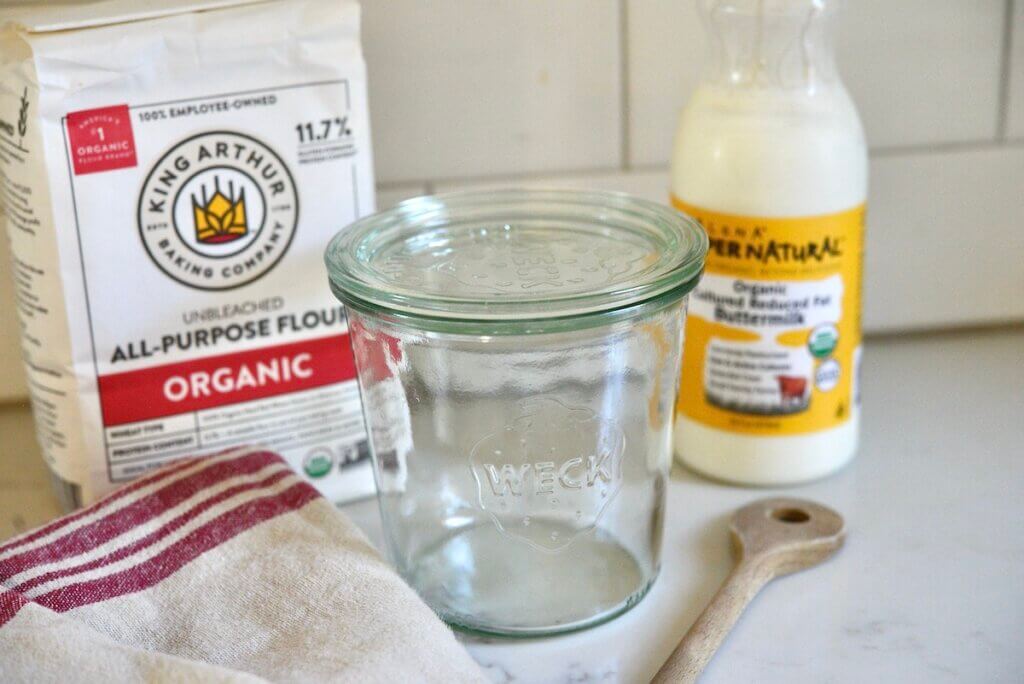
Helpful Tools and Equipment:
Given that people have been making sourdough starters for millennia you really don’t need much. However, here are the tools I prefer:
- Glass jar: While you can use any non-reactive container, I recommend using a Weck jar or mason jar. The main reason is that you can see through the glass. You can also easily clean them.
- Wooden spoon: you may have heard that you are not supposed to use metal with your sourdough. I am not sure I agree 100% but I do like to use small wooden or bamboo spoons for stirring.
- Beeswax wrap: I always recommend loosely covering your jar to keep things out that don’t belong in there. Some airflow is good, though, and that is why I always use my homemade beeswax wraps.
How to make your sourdough from scratch
- When making a sourdough starter it’s really important to start with a clean jar. You do not have to bleach or sterilize it. Just make sure it’s clean and has no soap residue in it.
- To that jar, add about ½ to 1 cup of buttermilk depending on how much starter you would like to create.
- Next, add some flour to the jar. It doesn’t matter how many grams of flour as long you create a pancake batter-like consistency. The amount of flour can vary depending on what type of flour you use. Do not overthink this!
- Stir this mixture vigorously with a spoon. Sourdough cultures like oxygen! If your mixture is too thick, add a little bit of water until you get that consistency.
- Optional: Add a pinch of caraway seeds and stir this mixture well.
- Loosely cover your starter. I like using beeswax wraps but you can use fabric, a paper towel, or a coffee filter. A rubber band will keep it in place. I just don’t like plastic wrap or any other tight-fitting lid that does not allow your starter to breathe.
- To get the fermentation process going, keep your sourdough starter at room temperature. An ideal temperature is somewhere between 70˚-75˚F. What if you don’t have a warm kitchen? I can tell you that I have made many starters in our kitchen in the winter with much cooler temperatures than that. Then, I just put it in a warm spot, such as a sunny window sill to capture some warmth.
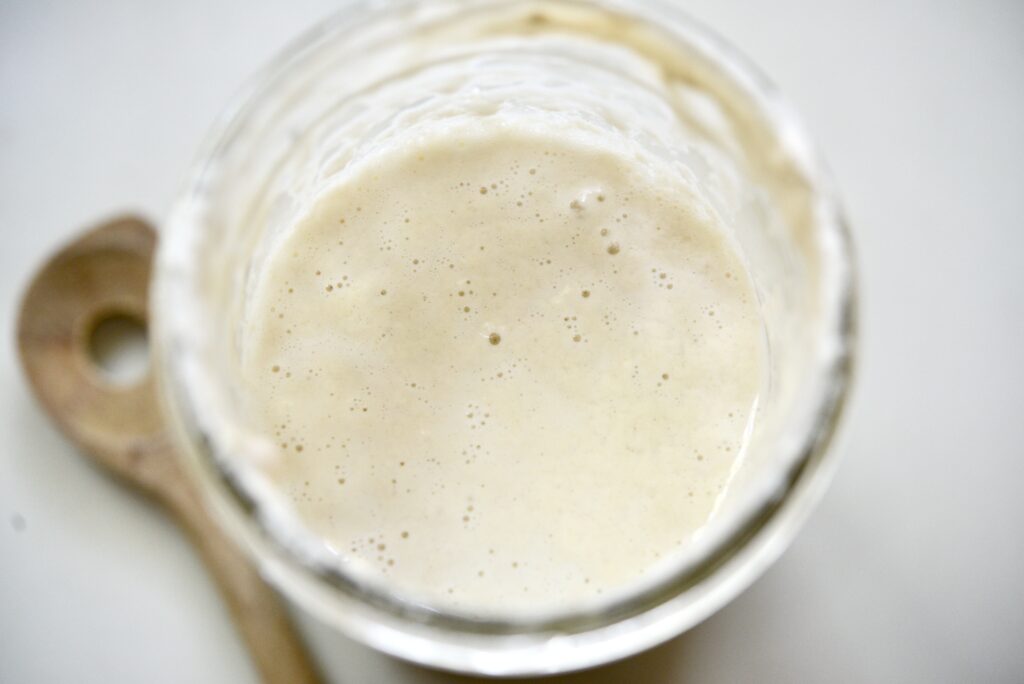
What to do over the next few days:
Every day now, you’ll want to check in with your sourdough starter. Simply, look at it, smell it, and give it a good stir. Don’t worry if nothing seems to be going on in the first day or two or three. Don’t let that fool you!
After a few days, you might see some small bubbles and you might notice a slightly sour smell. But don’t worry if this whole process might take up to 10 days. Eventually, you will get an active starter with some bubbles. Just remember that with the warm temperatures of summer, this process might happen quicker than if you’re doing this in the colder winter months.
Pro Tip: If you’re not sure whether you can keep your budding sourdough starter at a consistently ideal temperature, check out this sourhouse product that will take the guesswork out of it!
Another sign of an active sourdough starter is a hollow sound when you tap the bottom of your jar.
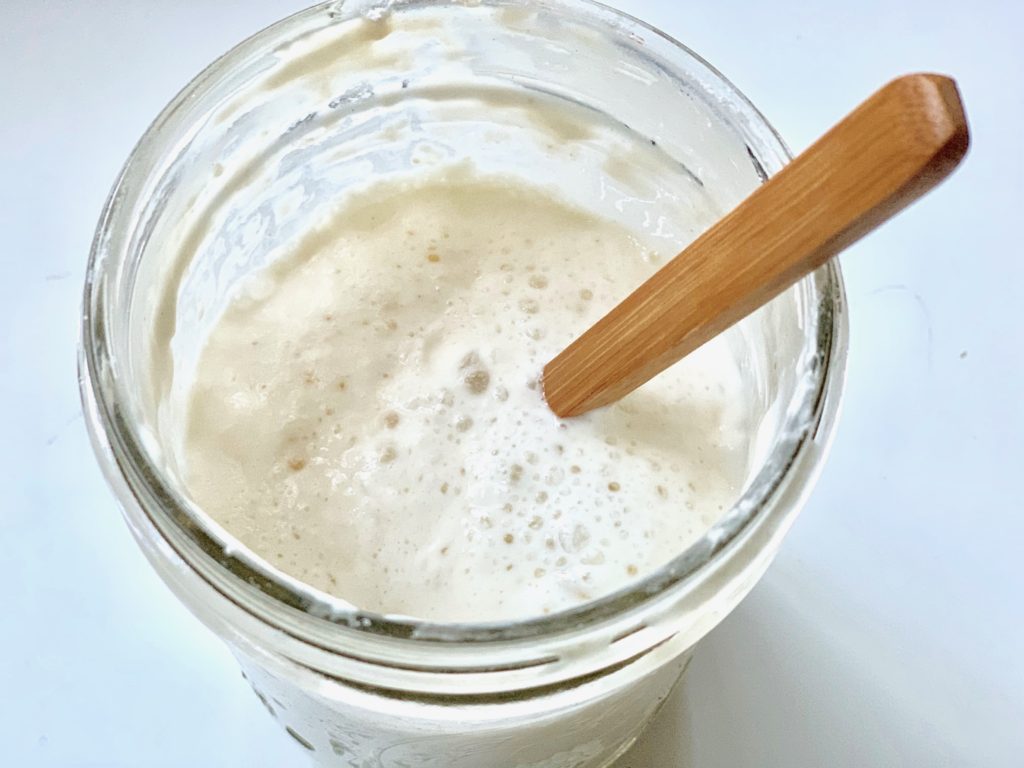
How to know when the sourdough starter is ready
Here are the signs that your new starter is ready:
- it has a pleasantly sour smell
- it has a fizzy taste
- there are lots of bubbles
- you can actually hear some activity
- it might pass the float test (drop a bit of starter in a glass of water, if it floats, it’s ready)
I also wrote a detailed article about how to know when your sourdough starter is ready for baking.
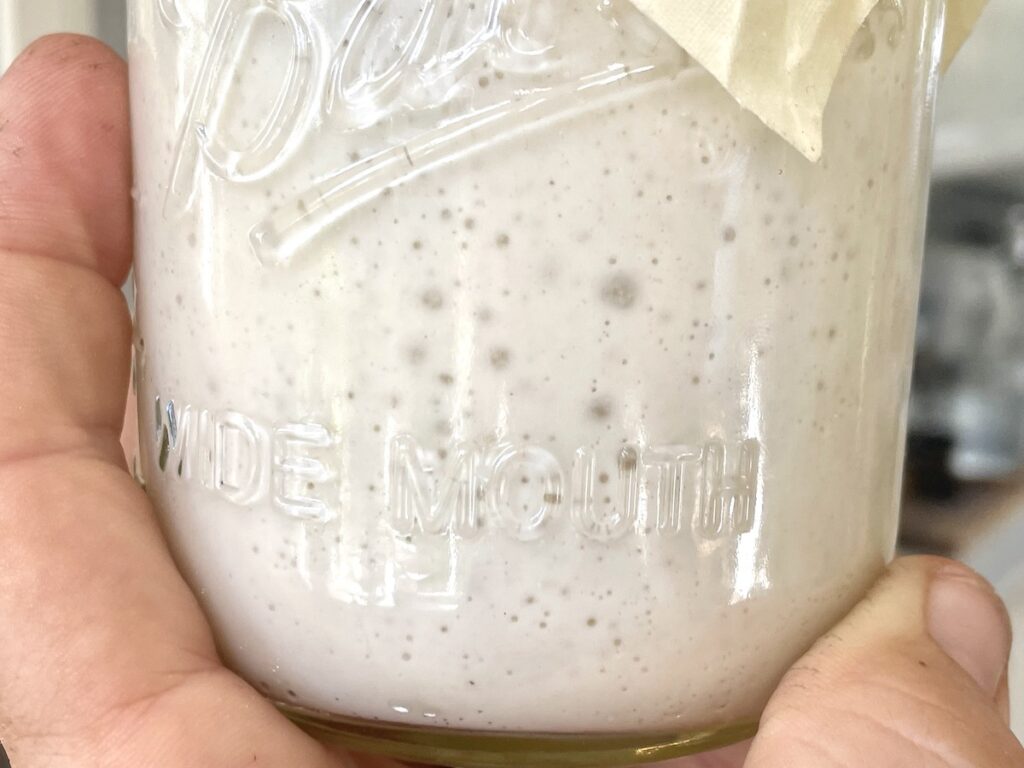
Is my sourdough starter active enough for baking?
At first, your sourdough starter will be pretty young. If you still want to bake with it but aren’t sure if it’s robust enough to give your loaf of bread a good rise, you can add ½ -1 tsp of commercial yeast to your sourdough bread dough.
You have a sourdough starter — now what?
Congratulations! You have successfully made your own starter!
You can now bake some homemade bread (such as this European-style whole-grain bread or a lighter, artisan-style bread) or use it in other recipes, such as sourdough pasta or even a sourdough lemon cake.
Some people actually like extra sour sourdough bread while others like theirs more on the mellow side. In a separate blog post, I am covering 17 ways how to manage the sourness of your sourdough.
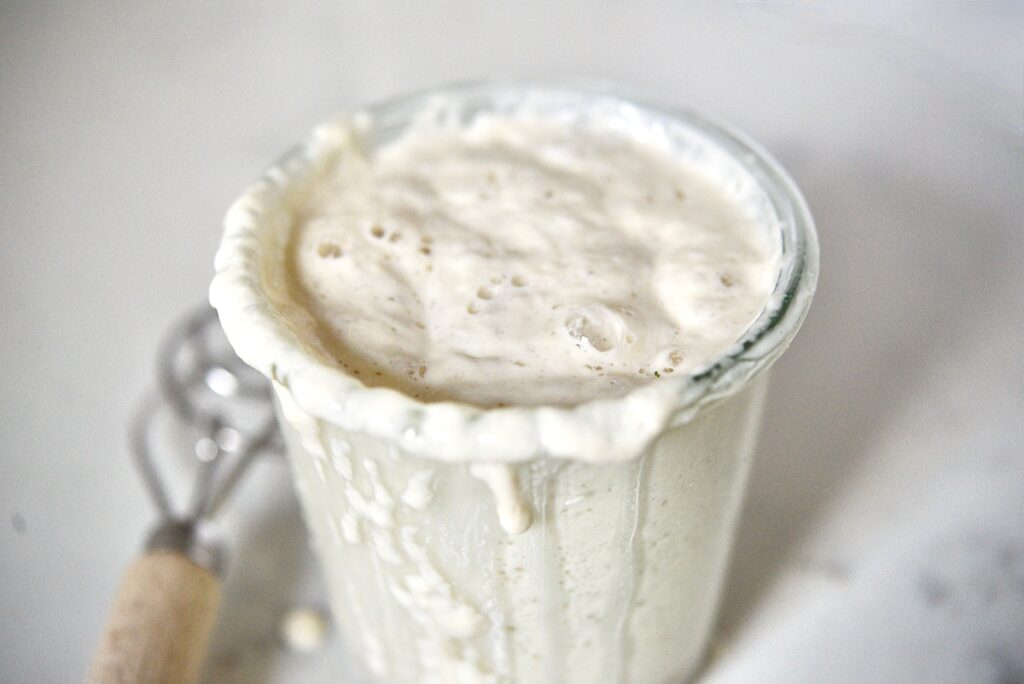
How to maintain your starter:
Since I love when things are simple and no-fuzz, the maintenance for my sourdough starter is the same.
In my family, we have never, ever fed or discarded any of our sourdough starters.
Instead, we have been using a very simple method that I describe. This easy method works best for people who bake 2 times a week or less.
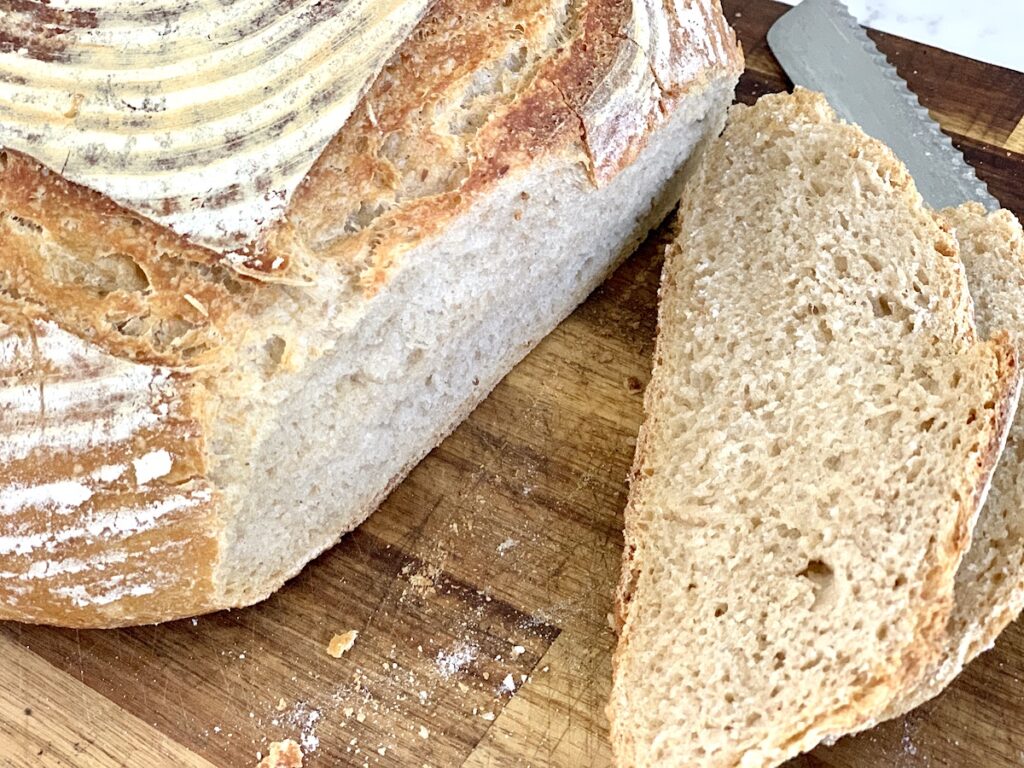
FAQs & Troubleshooting
I have another blog post in which I address many of the common challenges with making a sourdough starter. Since young sourdough starters tend to be the most vulnerable, I wrote a whole article on mold on sourdough starters.
Now, I say this to everyone who is new to sourdough baking: DO NOT GIVE UP! Your first bread may not rise. That’s ok. Just keep some of the sourdough starter and try again.
My bread tends to come out slightly differently every time. You see, sourdough is a living thing. It does react to the ambient temperature, humidity, wild yeasts in the air, and in the flour. While you can control the flour and the temperature a little bit, you will have less control over the humidity and wild yeasts in the air.
Instead, I recommend you relax and start getting a “feel” for your sourdough starter. It will be so rewarding once you get the hang of it.
And remember, if you don’t “trust” your starter, you can always add some yeast (about 1 tsp for an average-sized bread) to your dough to make sure it does rise!
Frequently Asked Questions:
If you can’t find or don’t have buttermilk, you can also use yogurt or kefir. If you are looking for a non-dairy alternative, you can use plain kombucha. The most important part is that whatever you use has live active cultures in it.
My method is a no-waste sourdough starter. That means you will use a lot less flour. While there are different ways, most other methods rely on discards and daily feedings.
While I haven’t done so, I guess you can call it that.
You can always add additional flour to your starter if it’s too thin. I actually do that myself sometimes.
You can head over to this article in which I answer the most common questions about sourdough.
If you want to delve deeper into sourdough baking or if you want more personalized help from me, I recommend you check out my signature online sourdough course. By enrolling, you can join my private Facebook group where you have direct access to me, ask me questions, and post pictures of your sourdough starter!
Watch the Video on Youtube:
My favorite bread recipes:
More sourdough recipes you might enjoy:
How to Make Sourdough Lemon Cake
Sourdough Carrot Cake with Maple Cream Cheese Frosting
How to Make a Sourdough Starter
Ingredients
- 1 cup buttermilk
- 1 dash filtered water
- 2-3 TBSP flour white or rye flour
- ½ tsp caraway seeds, optional
Instructions
- Combine buttermilk, water, flour, and caraway seeds in a glass jar (or in another non-reactive container.
- Adjust the ingredients so that your starter has a thick pancake batter-like consistency. Stir vigorously.
- Lightly cover and leave in warm, undisturbed spot. Check every day for progress. You can also stir it.
- Depending on the environment (temperature, moisture, wild yeasts), this can take about 5-10 days.
- Your sourdough starter is ripe when it has a pleasant sour smell and is bubbly and foamy. You can also drop a bit in some water: if it floats, it's ripe, if it sinks, it needs a few more days.
Notes
- while you don’t NEED the caraway seeds, they will greatly speed up the process of making a sourdough starter
- if you don’t have buttermilk, you can also use plain yogurt, kefir, or kombucha (dairy-free alternative) but make sure that whatever you use has live active cultures
Nutrition
Now I’d like to hear from you in the comments below! Have you tried making it? How did it turn out?
Pin For Later:
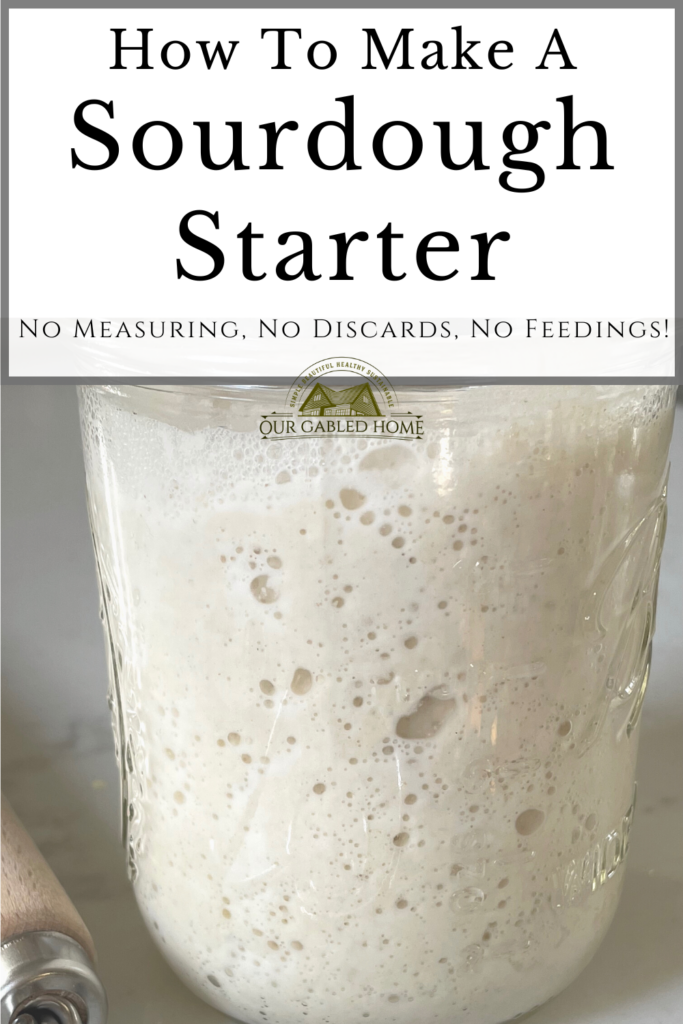
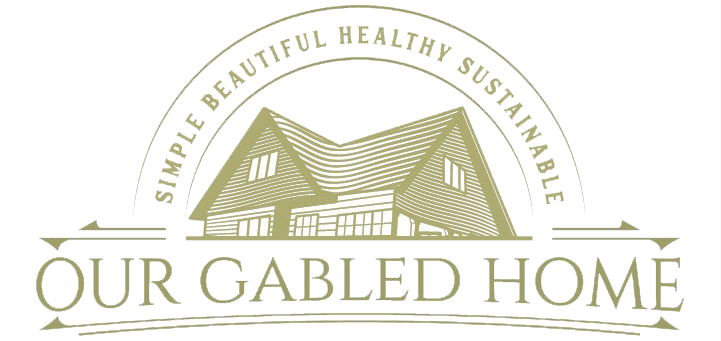

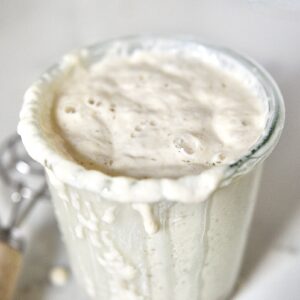
HELP!!! This is my second post asking for help. I have tried & tried to make the starter and it just will not rise. I don’t know what I’m doing wrong. I have followed this recipe over and over. The last time I left it in the jar for two weeks & nothing. It’s been chilly in my house so I’ve had it in the oven with the light on.
Unfortunately, it’s hard to do a remote diagnosis. My first tip is to never give up! I also recommend you check out this article (I know that you’re not dealing with mold but it might still be helpful): https://ourgabledhome.com/mold-on-your-sourdough-starter-check-out-these-causes/ Hope that helps ~ Anja
HELP!!!! I have followed this recipe to a t. This is like my 3rd try at making a starter & sourdough bread. The starter does not rise. It’s rather chilly in the house but I’ve got my jar in the over with the light on; this isn’t working either. Any suggestions??? I really don’t want to give up. Thank you.
Unfortunately, it’s so hard to diagnose what’s going on. And you shouldn’t give up. Have you considered joining my sourdough course where you can also get a lot more help: https://supersimplesourdough.teachable.com/p/super-simple-sourdough Hope that helps ~ Anja
I made sourdough bread for many years but quit about 5 years ago when I became aware that I had developed gluten intolerance. I decided yesterday that I would like to try gluten-free sourdough and found your excellent video on how to easily make and maintain a gluten-free starter. I made my starter using Robin Hood 1:1 gluten-free flour, home-made kefir and a generous pinch of caraway seeds. I also added a couple of tablespoons of Red River cereal which is a mix of cracked wheat, cracked rye and flax seeds. I put the the starter in the oven overnight with pot of boiling hot water.
This morning I was amazed to find that the starter had doubled in size and was bubbling merrily. This is in comparison to my previous rye flour starter that took about two weeks to get going. Anyway, I added more flour and water and put the starter back in the oven with a fresh pot of hot water. By noon the started had doubled in size again and looked ready to use. I went on-line for ideas on some bread that I could make quickly and found your recipe for Irish sourdough soda bread. Approximately 24 hours from the time I first put my new starter mix in the oven, I took my first loaf of sort-of-sourdough bread out of the oven.
You, Anya, are a precious store of knowledge and ingenuity for this developing age of scarcity where North Americans have to learn again how to get the utmost benefit from ever more limited resources.
That is great! Good for you! I am so glad you are being successful with your sourdough starter and baking ~ Anja
I have a SD started going from scratch. Its only a few weeks old but it is very active. Never thought about adding buttermilk but ya I can see how that will help get things going if you don’t have the patients to go throught the whole process. I been making bread with a Sweet Bread Starter for of 20 years. I feed it about once a week if I remember. It always comes back to life pretty fast. I have dehydrated it to have backups if neededin the freezer.
A little history on the Sweet Bread Starter. I got it from a fellow in Texas, I live in Northern Ontario Canada. I got the dehydrated package and a week later I was making bread. After his Dad passed away at age 82, his Mom later remarried and his
family was the owner of the Sweet Bread Starter. He has two sisters that
are old but still make Bread. He calls them “Keepers of the Bread”. They have
told him that their Mom and Grandmother and great Grandma all made bread
using this starter. There is a version of Sweet
bread in Germany called Herman Bread and his Step Father’s family is of
German descent. That is really about all he knows of the starter. he does know when he talks to
the “Keeper’s of the Bread” and tells them all the things and all the places
the starter is going and doing, they are very pleased. I have been told the
starter is over 150 years old plus. The ” Keepers” are both in their 90’s.
They are both way older now if they are even still alive.
I am so glad you got a good starter going! And thank you so much for sharing about the Sweet Bread starter. I used to make Hermann a lot as a teenager in Germany ~ Anja
I started the sourdough starter with your recipe and it’s amazing. I’ve made lots of bagels and bread. I wondering if I can double or triple the recipe for the starter or should I do it separately?
Yes, you can absolutely double or triple the starter ~ Anja
Hi there. Have you ever tried this with a gluten free flour like King Arthur’s 1:1? Also what type or yogurt is best?
I’ve been trying for about a month now to start my own from scratch and want to try this method to kick start my starter.
Thanks!
Yes, I have a separate post for a GF starter: https://ourgabledhome.com/the-easiest-gluten-free-sourdough-starter-ever/ I am sure you can use KAF for that ~ Anja
I’m not sure if anyone has asked these questions, but can you do this recipe with gluten free flour like King Arthur 1:1? Does it matter what yogurt you use?
My house is also always at about 68F. I’ve been reading so much about temperature, does it matter with this recipe?
I’ve been trying for a few weeks and can’t get a good start and would to try this method to jump start my starter. Thanks!
Yes, you can use pretty much any GF flour mix. It doesn’t matter what type of yogurt as long as it doesn’t have anything added and contains live active cultures ~ Anja
Mine developed mold in the very top of the jar where there was some stuck to the side of the jar, not on the actual starter but I through it all away and started over and added more flour than I did the first time. I am not sure what I did wrong. I moved it around to different places because my house is cold and drafty right now so it was hard to find a warm spot. I stirred it a few times throughout the process and kept a loose fitting lid on it. My house is dusty so I didn’t want to put a rag on it incase there was dust on the rag so I put the jar lid on but just didn’t tighten it, could that be it? I’ll see how the next batch goes but not sure what to do if it happens again.
I recommend reading this post for more info: https://ourgabledhome.com/mold-on-your-sourdough-starter-check-out-these-causes/ ~ Anja
I made my “buttermilk starter “ on 1/24/24, baked my first loaf of sourdough today and it came out great. I did not add any yeast and was afraid that was a mistake since she is just a baby. I gave her my trust and put the loaf in the oven…..😲🥴 whaaa hooo !! Gwendolyn arose to the challenge ! The bread came out beautifully. Thank you for the great starter recipe. I made a couple before and unfortunately I forgot about them and thought I killed them. Now I find your YouTube channel and discover I probably buried Frank and Stella ALIVE 😵 ugh gulp. 😂 Thanks again and happy baking.
That is so great to hear!!! Good for you 🙂 ~ Anja
Hi I stated the SD starter recipe with buttermilk what will be feeling Schdual do I feed every 24 hour or 12 hours
For this method, you do not need to feed your starter ~ Anja
Hi, I did the method of no feedings and discard method. I used the yoghurt and flour and a dash of water. Now it’s been 5 days in and smells and has risen. So what do I do now for making sourdough bread?
Some people will tell you that it’s too young to bake with (also having something to do with there not being enough beneficial bacteria to outnumber the potential unwanted bacteria) but I have successfully baked with a young starter. Ultimately, it is up to what you are comfortable with ~ Anja
Will this method work for Einkorn all purpose and whole grain flour?
Yes, this method works with pretty much any flour ~ Anja
Hello, Thank you for the wonderful ‘different’ version of starter with using live cultures- I used yogurt. I had the first wildly successful starter at Day 2.5 last eve, it was so bubbly robust and grown like no other. HOWever, this morning it was flat. Plumb flat. It is way earlier than 5 days to start using, so my question… should I be feeding it flour at certain intervals. I have been searching and watching all the videos and have not found the answer to what to do if…? Thanx so much!
It sounds like you had a very happy starter that may just have been hungry. If it’s flat you could feed it with some flour and water. Some people will tell you to not bake with a young starter (also having something to do with there not being enough beneficial bacteria to outnumber the potential unwanted bacteria) but I have successfully baked with a young starter. Ultimately, it is up to what you are comfortable with ~ Anja
I didn’t have buttermilk or yogurt but I did use vinegar and milk to make my own as a quick fix. Do you think this will work? I’m not sure that it has live cultures…
Vinegar (or lemon juice) will only curdle milk but not culture it. Therefore, you need buttermilk, yogurt, or kefir with live active cultures ~ Anja
Maybe I did it wrong, but I was told from a friend who uses this method that it can be used immediately after 24 hours. But I did 2C white all purpose flour and 2C buttermilk. Stirred it. Left lid on jar loose and it sat overnight. So… do I just stir it for the next few days or can I use it to bake? First time sourdough journey so I’m very new to all this.
Some people will tell you to not bake with a young starter (also having something to do with there not being enough beneficial bacteria to outnumber the potential unwanted bacteria) but I have successfully baked with a young starter. Ultimately, it is up to what you are comfortable with. If you are trying to bake with it the next day, you might need yeast or another leavening ~ Anja
I love all that you share with us and your method for making sourdough bread has worked well for me. I am wondering why you include yeast in some of your recipes if you are using a sourdough starter, such as your pizza dough for example. I thought we didn’t need yeast if we have a starter.
If you have a good, mature SD starter you should not need to add yeast. However, I sometimes recommend it so that even beginners can feel successful and they are guaranteed a good rise ~ Anja
I made this starter on the 20th while visiting daughter in GA. Took all the way back home to KY and it’s very active and smells great. Easy to follow even for a 4 year sourdough baker.
That sounds great and I am so happy to hear you found my method easy to follow ~ Anja
Day 6, stirred everyday and it was up about 1/2″ this morning! When I stir it it drops back down. My question is, if I use some for baking the quantity is reduced so I DON’T feed it? I am so confused on this. And if I only bake with it once a week, do I put in the frig in the meantime? TIA
It will drop down if you stir it because all the gases are released. Many recipes use weight vs volume since that will be more accurate. You can absolutely keep your SD starter in the fridge between bakings: https://ourgabledhome.com/easy-sourdough-starter-no-feedings-no-discards/ Hope this helps ~ Anja
I did my starter with Greek yoghurt and added the White four until it reached a creamy texture, I also added a pit of filtered water.
On the 2nd day, the starter showed no rise or development at all however on the 3rd day I founded
Something like cotton(?) inside the jar, I don’t know how to describe it, although I did clean using boiled water. What l’ve done wrong ?
It is almost impossible to give a remote diagnosis but I COULD have been harmless Kahm yeast. If in doubt, I would start over again ~ Anja
I am new to sourdough making and followed your recipe, using buttermilk, organic whole wheat flour and caraway seeds. I am making 2 starters (one for my daughter). This is day 5, and one starter has doubled in size overnight, while the other starter looks about the same. Should I continue to stir them both each day? Or should I treat the larger starter differently?
I’m so excited! Thanks for any guidance!
Yay, I am so glad to hear you’re making sourdough starters. If one is doing so much better than the other, you can even mix them up to get the more sluggish one going. Hope that helps ~ Anja
Greetings from Portugal!
I began mine 4 days ago, made with Skyr beacause at the store there wasn’t any buttermilk. Added rye flour and whole wheat.
It hasn’t grown yet… I’ve been trying to have it in places around 24ºC through the house ; )
Should I stir it twice a day? Would a minute be enough?
Thank you very much!
It might take up to 10 days especially if this is your very first SD starter. Stirring more often might help since it adds oxygen. Hope this helps ~ Anja
i made this yesterday. i live in a tropical country and temperatures are consistently 30 degrees celcius so i was wondering if my starter will go bad. day 2 and there are a bit of bubbles and smells sour but i’m unsure how to identify if it’s a good smell. in such a hot temperature, will my buttermilk starter go bad?
You might like to check out my post on mold on SD starters: https://ourgabledhome.com/mold-on-your-sourdough-starter-check-out-these-causes/ To me it sounds like your starter may be ready! Buttermilk will not spoil very quickly and it shouldn’t hurt your SD starter even at 30˚C. Hope this helps ~ Anja
Hi there,
Me and my kids of five made your SD starter. We have to use AP flour, what should we see tomorrow? The kids name it too; the Named it Susie Rex SD starter; I love my kids-They are so funny!
Love it!
Hi Anja! I was wondering, when storing the starter in the fridge, does the jar need to be screwed on/capped tightly? Do you have a jar recommendation? And lid? I’m so excited to try making a starter for the first time. Thanks so much!
I like to keep a close lid on it so that other things that might swirl around in your fridge won’t interfere with your SD starter. A mason jar works well but I am really loving my Weck jars ~ Anja
Hi there,
Me and my kids of five; made your SD starter tonight around 5:30, or 6 pm EST. We used AP flour though, hope that is okay. My two older boys name the SD too; they name it Susie Rex SD starter. What would see within the next few days?
Yay, how fun! It may take up to 10 days but look for bubbles and a pleasant sour smell ~ Anja
Okay! Sound good, and do I leave it right on the counter? Until it is ready to use, or is it best to put it in the fridge?
Hey Anja;
With this being about 24 hours since me and my kids made your SD starter, do I feed it? Also how often do I stir Susie Rex SD starter;
Hey Anja;
With this being about 24 hours since me and my kids made your SD starter, do I feed it? Also how often do I stir SD starter;
I was wondering if a probiotic “shot” like Yacult could work in place of buttermilk?
Good question – it might! You can always give it a try and see what happens (keep me posted!) ~ Anja
I have been tending my starter every morning for almost a week, this morning it had black and white mold on the sides of the jar. The smell so far has smelt like buttermilk and the only time I have really seen bubble was when I would mix it.
Oh, no!!! There are a lot of things that can lead to mold on sourdough starters. Here’s another resource: https://ourgabledhome.com/all-your-sourdough-questions-answered/ You might also want to consider signing up for my online sourdough course where you can get more personalized help: https://ourgabledhome.com/product/super-simple-sourdough-course/ Hope this helps ~ Anja
Can you use just plain water instead of buttermilk to make the starter??
Yes but then you will need to do discards and feedings ~ Anja
I am so happy to find you. I am single and feeding a starter consistently just does not work for me. I cannot eat that much bread and I love Sour Dough Bread. I am going to try your method with dried cultured buttermilk. I do not use milk products but sometimes you just need to go there. I will let you know how it all turns out. Thank you
That makes me so happy to hear! Happy sourdoughing ~ Anja
Hi Anja
I’m thinking this is the recipe I’ve been searching for. I see that you can substitute with Kombucha for a dairy free option, but I was wondering if I could substitute with sieved wild yeast water made from dates instead?
I also love how this method is discard free and will be using your method for maintaining.
Thank you so much
I think that should work but keep me posted on your results ~ Anja
Hello! Am I able to make this work without using the caraway seeds?
In short: yes! You can also grind the caraway seeds. Feel free to try it without them. Should you not succeed you can always try adding them ~ Anja
The answer may be obvious but: Your bread recipes call for different amounts of starter. Hearty Whole Grain Sourdough calls for 1.5 too 2 cups of starter. How can I make/have 2 cups of starter? Seems like the jar has much less.
I sorta want to make my starter from scratch. I purchased some original San Francisco dehydrated starter. Any experience you can share with this type of starter was be appreciated.
I recommend you follow the instructions to get your SF starter going. It is not all that different from mine, in fact, once you have used it a few times it will include the very specific wild yeast strains that live in your kitchen and be different from the one you bought. Hope this makes sense ~ Anja
Anja,
I bought some original San Francisco starter (dehydrated). Can I pretty much replicate your starter method by adding water, Diastatic Barley Malt, and carraway seeds?
Hi Darrell, most likely your starter came with instructions. Once you have it going nicely you can use my SD maintenance method: https://ourgabledhome.com/easy-sourdough-starter-no-feedings-no-discards/ OR bake SD bread: https://ourgabledhome.com/easy-no-knead-sourdough-bread/ Hope this helps and happy baking ~ Anja
My first started never “made”. Poured it out on day 14, even had the caraway seeds in from the beginning. Is it likely that your flour scoop is more than a tablespoon and it needs more flour in my starter?
Hi Lois, there could be so many reasons your starter never took, some of them being the temperature in your kitchen too low, not stirring the starter, and even the possibility that you have never made a starter before (and the lack of ambient good bacteria). I encourage you to try again, use enough flour to create a pancake batter-like consistency, and keep me posted! Anja
I accidentally forgot to stir for a couple of days and on day 6 there was black mold growing in it and on the sides. I’ve had it sitting in a crockery on my counter. Was the mold caused by the lack of stirring? I dumped it out and am starting over again. I am using the buttermilk and organic caraway seeds.
Hi Laura, it’s hard to make a remote diagnosis but the most common cause for mold is either when the container wasn’t 100% clean (even soap residue) can do it or if you’re not using filtered water. I think you did the right thing by starting over again. Hope your next starter will be great ~ Anja
My next batch worked and I’ve made bread a few times now, although I didn’t have a Dutch oven and had to use two bread pans on two occasions. I don’t bake a whole lot so I used your method of storage with lots of flour and on top and covered. I think it stayed in there about 3 weeks and there was some faint black mold again around the top and sides, but I scraped it off. I did use a clean container and filtered water. Yesterday, I used my cup of starter and didn’t have but a tablespoon left, so I fed with some extra flour and filtered water and letting it stay at room temp for awhile before putting back in fridge. I have a new Brandani cast iron 6.3 qt. 11” Dutch oven now, too, so looking forward to seeing how the next loaf turns out! Thanks! 😊
Hi Laura, tap water and bleached flour can sometimes cause the SD starter to get moldy so I always recommend using filtered water and unbleached (ideally organic, too) flour. But it sounds like you are well on your way to successful sourdoughing! Happy baking ~ Anja
I needed WAY more than 2-3 tb (as in 1/3-1/2 C!) of flour to make it the same consistency as Anja’s. It does work that way 🙂 Just look at consistency as your reference.
Yes! Good tip and thank you for sharing! Ultimately, it’s all about the consistency and less about exact ingredients ~ Anja
My starter formed hooch on top should I mix it back in or pour it off
There are bowls on top of the hutch
Also my starter was really bubbly all the way to the top of the jar on the fourth day should I have used it then instead of waiting till the seventh day
Thank you
I meant to say bubbles on top of the hooch
My first question how to spellcheck errors
Ive just come across your YouTube videos which I loved. I’d very much like to try making your sourdough recipe – as a non-milk user can you advise of what other base can you use?
You can absolutely make a sourdough starter with just flour and water. Many people do! Thank you do much for your sweet comment ~ Anja
Thank you for sharing your recipe and tips Anja. I’m a total novice so would you mind letting me know how much flour to add to a starter before putting it in the fridge fir next time? Thanks Gail
Hi Gail, I am so glad you like my sourdough starter method! I don’t know if I can give you exact measurements, especially since I don’t know how much starter you have. I simply add a lot of flour and mix it up. You want a very stiff dough. I have a video in which I explain that a bit better: https://www.youtube.com/watch?v=POD2gRL799Q&t=258s Hope this helps but let me know if you have more questions 😊 ~ Anja
This starter works wonderfully, and no waste. Made a danish rye (rugbrod) and couldn’t ask for a better loaf of bread. Thank you for helping to make this so easy.
That makes me so happy to read a comment like yours!!! Thank you for sharing ~ Anja
Can you use that kind of method/ technique to any sourdough starter?
Thanks.
Hoping that I understand your question correctly, I want to say yes. Hope this helps ~ Anja
Thank you for sharing your knowledge; site has me in awe. I can’t wait to bake bread. Your “Hearty Whole Grain Sourdough recipe calls for 1 1/2-2 cups of starter. Does your “Starter recipe” yield that amount of Starter, or will I have make a larger batch. In your videos, it does not appear you are using that much,
Thank you for your comment! My challenge is that I cook and bake mostly by feel but then I need to come up with reliable amounts and measurements for my recipes and videos. You can absolutely use less starter and increase both the temperature (just a bit warmer) and the rise time. Hope this helps 💛 ~ Anja
Hi, thanks for the recipe. I don’t have carraway seeds. Is it a must or can I leave it out
You can absolutely leave out the caraway seeds. I don’t even know exactly WHY we put them in there, other than my mom saying that they “help the sourdough” 😊
So I am on day two with the kefir method. Lots of bubbles… Do I need to feed the starter? This doesn’t appear to be enough to bake with after seven days. Did I miss something?
I never feed it when making the sourdough starter. For baking bread you don’t need a whole lot but if you’re skeptical about the strength of your sourdough you can always add a sprinkle of dried yeast. You can also watch my video on this https://www.youtube.com/watch?v=xoo1mS9F1f8&t=5s Hope this helps ~ Anja
Really excited to try this, your method seems like it’d be perfect for how often I bake! Quick question though, are the caraway seeds necessary? What is the purpose of them? Mahalo for your time!
Thank you and yes, this method is perfect for people who don’t bake very often. My mom recommended the caraway seeds but I couldn’t find any explanation why exactly they help the sourdough. However, they are not necessary at all, in fact, we may be the only people using them in their starter … Hope this helps ~ Anja
Anja, could use Kefir as well? Or just buttermilk. I was one Pintrest looking for something else and saw your pin about Fermented foods. I love all you tips. I was never a big fan of Sauerkraut but Sauerkraut in Deutschland is SOOOOO different(LOVE IT NOW) than what I had eaten in the States. I am now a fan. Love all your tips on Sourdough bread and starter. I am going to try your starter with buttermilk. Will let you know how things go. Vielen Dank! Schoenes Tag!!!
Thank you for your nice comment! I haven’t tried kefir but it could work. If you do use it, let me know how it worked. Danke und liebe Grüße!
In place of buttermilk can I use sour milk made by adding vinegar or lemon juice to whole milk?
Although I have not tried that I don’t see any reason why it shouldn’t work – adding vinegar and lemon is a quick way to make buttermilk. Hope this helps and I’d love to hear your experience!
So much good info!
Thank you, Marisa!!
Thank you for this post! I need to go feed my starter and get back to making bread!! I’m inspired thank you!
Yeah, I am so glad this inspired you! Happy baking!
I have got the start my sourdough starter again!!! This looks so good.
Yes – and happy sourdoughing 🙂
I need to do this. I have found sourdough to be so intimidating but your method breaks it down step-by-step which is super helpful for someone like me!
Yes, it needn’t be complicated! I hope you give it a try and love it as much as we have for generations!
Making a starter is on my list of things to do this year! Thanks for giving me a push and reminding me that it’s really not that hard.
It really isn’t! Have fun making it!
Can you taste the caraway in the starter when using it in your recipes? I inherited my mom’s distaste for caraway and can’t stand the flavour!
I am not that fond of caraway seeds, either, but when they’re soaked (as in this starter) we don’t taste them.
I’ve tried several times to start my own sour dough but for some reason it hasn’t work for me yet. Your recipe is a little different than the others I’ve tried so maybe I’ll have to give it a try. Thanks for sharing.
Yes, my recipe is very different! First of all I am using buttermilk (which already adds good bacteria) and if you saw my video, my mom has always been adding caraway seeds. That starter came out beautifully and I just made the most delicious bread with it! Keep me posted and feel free to ask me questions! Hope your starter comes out nicely!!
I just made my first starter (well second I guess as the first one didn’t do too well). It’s going great now though and I love baking with it!
Yeah, how exciting! Keep us in the loop with gorgeous pictures of your baked goods!
I have wanted to try making sourdough starter for a while now! I’m horrible at cooking though so I’ve been putting it off. Your recipe looks so easy to follow!
Thank you and yes, please give it a try! Let me know if you’re running into problems 😌
Thanks for sharing, such great information!
Thank you so much! I am so happy that you found this valuable!
I have been wanting to do this. Hopefully I will get a chance to try it soon!
Oh, great! Keep my posted on your sourdough adventures!
Sourdough is my favorite!! So much easier on the gut!! I’m excited to try this!!
Absolutely! I barely eat anything else than sourdough. Thank you for your nice comment!
Your site looks so nice! You have been working hard! My son is interested in making sourdough. He had a starter that recently died…RIP ha. We will definitely try your method!
Thank you so much! I hope that you’ll love my method! Happy sourdoughing!